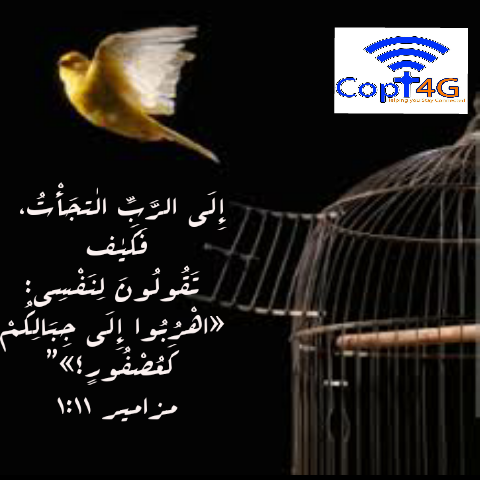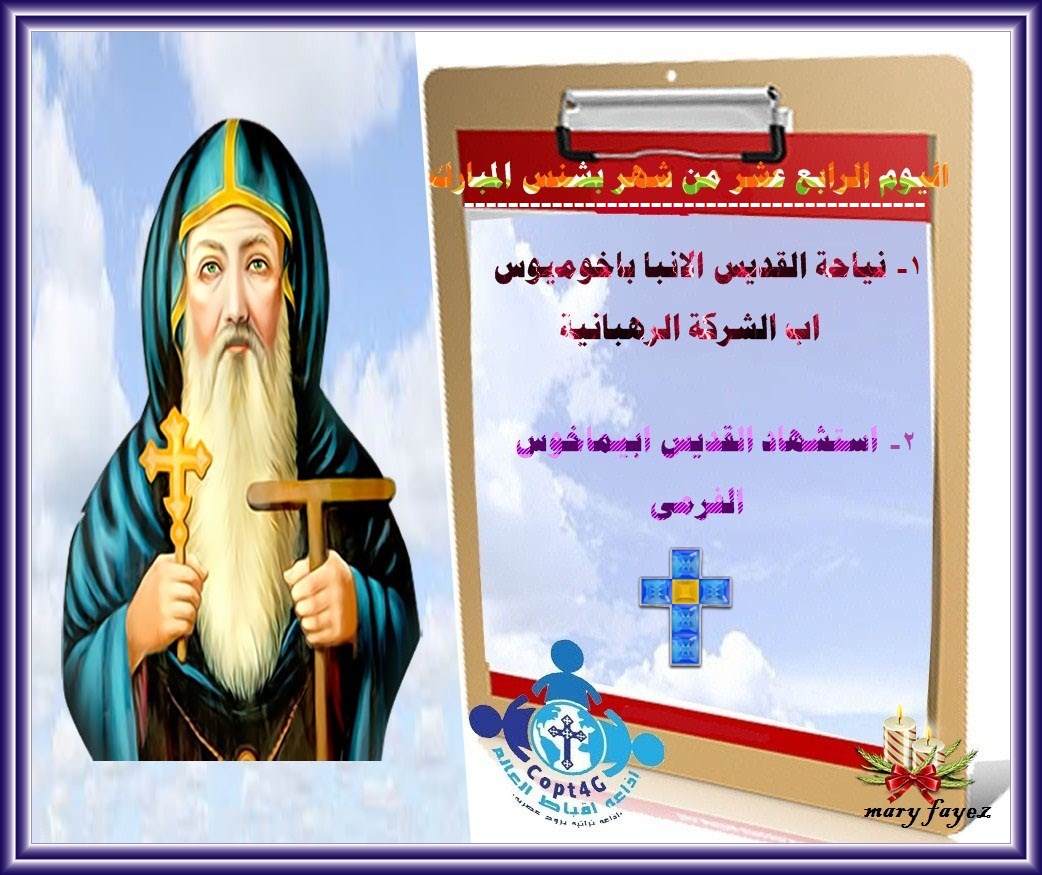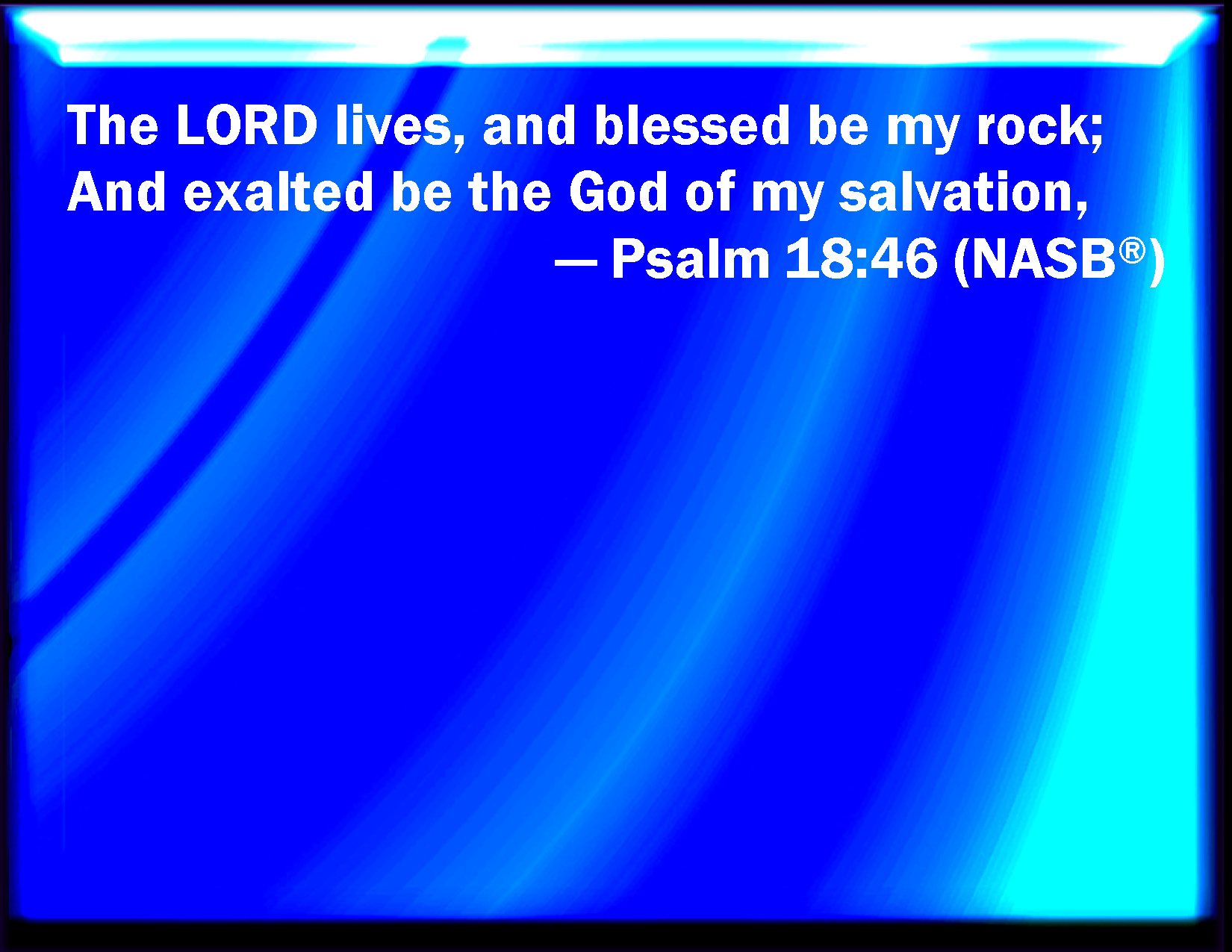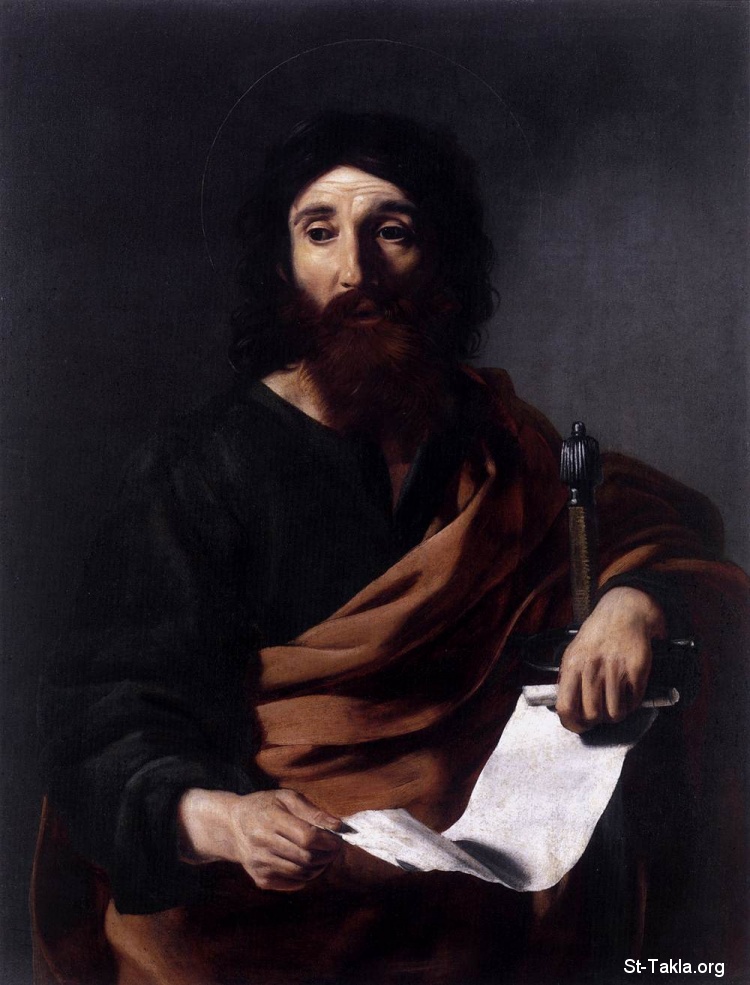

اليوم 14 من الشهر المبارك بشنس, أحسن الله استقباله، وأعاده علينا وعليكم، ونحن في هدوء واطمئنان، مغفوري الخطايا والآثام، من قِبَل مراحم الرب، يا آبائي وأخوتي.
آمين.
14- اليوم الرابع عشر - شهر بشنس
نياحة أنبا باخوم أب الشركة
في مثل هذا اليوم من سنة 64 ش (348م ) تنيح الأب القديس الأنبا باخوميوس أب الشركة الروحانية . ولد هذا الأب في طيبة ( الأقصر ) من والدين وثنيين أجبراه علي عبادة الأصنام فهزأ بهذه العبادة ثم ترهب عند القديس بلامون ومكث تحت طاعته عدة سنين أتقن فيها أمور الرهبنة جيدا وبعد ذلك ظهر له ملاك الرب وأمره أن يؤسس شركة رهبانية مقدسة فاجتمع عنده عدد وفير من الرهبان فشيد لهم جملة أديرة وجعلهم تحت نظام واحد في شغل اليد وأوقات الطعام والصلوات وكان هو أبا عليهم جميعا وجعل لكل دير رئيسا وكان يمر عليهم جميعا من أقصي أسوان وأدفو ودوناسة إلى آخر الصعيد من الجهة البحرية ولم يكن يسمح لأحد من أولاده أن يصير قسا حتى لا يتزاحموا علي الكهنوت وتضيع الغاية المقصودة من العبادة والبعد عن العالم وكان يدعو لكل دير كاهنا علمانيا يقدس به ولما أراد البابا أثناسيوس أن يرسمه قسا هرب منه . فقال لأولاده : قولوا لأبيكم الذي بني بيته علي الصخرة التي لا تتزعزع وهرب من المجد الباطل " طوباك وطوبي لأولادك " .
وقد اشتهي مرة أن يري الجحيم فرأي في رؤيا الليل منازل الخطاة ومواضع العذاب . وأقام رئيسا علي الشركة أربعين سنة . ولما دنا وقت نياحته ثبتهم وعين لهم من يتولي تدبيرهم من بعده وتنيح بسلام
صلاته تكون معنا . آمين
استشهاد القدس أبيماخس الفرمي
في مثل هذا اليوم استشهد القديس أبيماخس . وقد ولد هذا القديس بالفرما وكان حائكا مع رفيقيه تادرس وكللينيكس ، فلما سمع بقدوم يولاميس والي مصر لتعذيب المسيحيين وعظ رفيقيه مبينا لهما بطلان هذا العالم ثم ودعهم وخرج إلى البكروج القريبة من دميرة ، فوجد الوالي يعذب امرأة ثم بعد أن عذبها ألقاها في أتون النار فصار لها مثل الندي البارد فأخرجها وقطع رأسها .
فلما رأي ذلك تقدم من الوالي واعترف بالسيد المسيح له المجد فعذبه كثيرا ، وكان وقتئذ عمره سبعا وعشرين سنة . ثم أمر بعصره بالمعصرة فخرجت من جسده نقطة دم وقعت علي عيني طفلة عمياء فأبصرت لوقتها فأمن أهلها بالسيد المسيح ونالوا إكليل الشهادة فغضب الوالي وأمر بصلبه ثم قطع رأسه فامتثل السياف للآمر ولكن قوته خارت فلم يقدر علي رفع سيفه فجاء آخر فحدث له كالأول . وهكذا إلى أربعة عشر سيافا ولما لم يفلحوا في قطع رأسه طوقوا رقبته بحبل وسحبوه حتى أسلم روحه بيد الرب ونال إكليل الشهادة.
وحمل أحد الجند الجسد لطرحه بعيدا وكان هذا الجندي أصما فلما لمس جسده انفتحت أذناه فسمع للحال . وأتي قوم من مدينة ادكو وأخذوا الجسد وقد ظهرت منه آيات كثيرة .
وحضر أهل الدميرتين ليعزوا أهل الشهيد ولما رأوا الآيات الباهرة التي ظهرت منوا وتعمدوا وكان عددهم ألف وسبعمائة وخمسين نفسا رجالا ونساء وصبيانا ثم حمله أهله إلى البرمون بكرامة عظيمة وقد كفنه والي البرمون بأكفان غالية الثمن من ماله الخاص وبنوا له كنيسة علي اسمه .
شفاعته تكون معنا . ولربنا المجد دائما . آمين

العشية
مزمور العشية
من مزامير وتراتيل أبينا داود النبي.
بركاته علينا، آمين.
مزامير 18 : 46 - 47
الفصل 18
| 46 | حي هو الرب ، ومبارك صخرتي ، ومرتفع إله خلاصي |
| 47 | الإله المنتقم لي ، والذي يخضع الشعوب تحتي |
مبارك الآتي باسم. الرب، ربنا وإلهنا ومخلصنا وملكنا كلنا، يسوع المسيح ابن الله الحي، له المجد من الآن وإلى الأبد.
آمين.
إنجيل العشية
قفوا بخوف أمام الله، وانصتوا لسماع الإنجيل المقدس.
فصل شريف من بشارة معلمنا يوحنا الإنجيلي.
بركته تكون مع جميعنا، آمين.
يوحنا 6 : 70 - 7 : 1
الفصل 6
| 70 | أجابهم يسوع : أليس أني أنا اخترتكم ، الاثني عشر ؟ وواحد منكم شيطان |
| 71 | قال عن يهوذا سمعان الإسخريوطي ، لأن هذا كان مزمعا أن يسلمه ، وهو واحد من الاثني عشر |
الفصل 7
| 1 | وكان يسوع يتردد بعد هذا في الجليل ، لأنه لم يرد أن يتردد في اليهودية لأن اليهود كانوا يطلبون أن يقتلوه |
والمجد لله دائماً.
باكر
مزمو باكر
من مزامير وتراتيل أبينا داود النبي.
بركاته علينا،
آمين.
مزامير 118 : 26 - 27
الفصل 118
| 26 | مبارك الآتي باسم الرب . باركناكم من بيت الرب |
| 27 | الرب هو الله وقد أنار لنا . أوثقوا الذبيحة بربط إلى قرون المذبح |
مبارك الآتي باسم الرب، ربنا وإلهنا ومخلصنا وملكنا كلنا، يسوع المسيح ابن الله الحي، له المجد من الآن وإلى الأبد.
آمين.
إنجيل باكر
قفوا بخوف أمام الله، وانصتوا لسماع الإنجيل المقدس.
فصل شريف من بشارة معلمنا مرقس الإنجيلي.
بركته تكون مع جميعنا، آمين.
مرقس 7 : 5 - 8
الفصل 7
| 5 | ثم سأله الفريسيون والكتبة : لماذا لا يسلك تلاميذك حسب تقليد الشيوخ ، بل يأكلون خبزا بأيد غير مغسولة |
| 6 | فأجاب وقال لهم : حسنا تنبأ إشعياء عنكم أنتم المرائين كما هو مكتوب : هذا الشعب يكرمني بشفتيه ، وأما قلبه فمبتعد عني بعيدا، |
| 7 | وباطلا يعبدونني وهم يعلمون تعاليم هي وصايا الناس |
| 8 | لأنكم تركتم وصية الله وتتمسكون بتقليد الناس : غسل الأباريق والكؤوس ، وأمورا أخر كثيرة مثل هذه تفعلون |
والمجد لله دائماً أبدياً، آمين.
قراءات القداس
البولس
بولس، عبد يسوع المسيح، المدعوّ رسولاً، المُفرَز لإنجيل الله.
البولس، فصل من رسالة القديس بولس الرسول إلى رومية .
بركته تكون مع جميعنا، آمين.
رومية 6 : 5 - 11
الفصل 6
| 5 | لأنه إن كنا قد صرنا متحدين معه بشبه موته ، نصير أيضا بقيامته |
| 6 | عالمين هذا : أن إنساننا العتيق قد صلب معه ليبطل جسد الخطية ، كي لا نعود نستعبد أيضا للخطية |
| 7 | لأن الذي مات قد تبرأ من الخطية |
| 8 | فإن كنا قد متنا مع المسيح ، نؤمن أننا سنحيا أيضا معه |
| 9 | عالمين أن المسيح بعدما أقيم من الأموات لا يموت أيضا . لا يسود عليه الموت بعد |
| 10 | لأن الموت الذي ماته قد ماته للخطية مرة واحدة ، والحياة التي يحياها فيحياها لله |
| 11 | كذلك أنتم أيضا احسبوا أنفسكم أمواتا عن الخطية ، ولكن أحياء لله بالمسيح يسوع ربنا |
نعمة ربنا يسوع المسيح فلتكن معكم ومعي، يا آبائي وأخوتي،
آمين.
الكاثوليكون
فصل من رسالة 1 لمعلمنا يوحنا .
بركته تكون مع جميعنا،
آمين.
1 يوحنا 4 : 18 - 5 : 1
الفصل 4
| 18 | لا خوف في المحبة ، بل المحبة الكاملة تطرح الخوف إلى خارج لأن الخوف له عذاب . وأما من خاف فلم يتكمل في المحبة |
| 19 | نحن نحبه لأنه هو أحبنا أولا |
| 20 | إن قال أحد : إني أحب الله وأبغض أخاه ، فهو كاذب . لأن من لا يحب أخاه الذي أبصره ، كيف يقدر أن يحب الله الذي لم يبصره |
| 21 | ولنا هذه الوصية منه : أن من يحب الله يحب أخاه أيضا |
الفصل 5
| 1 | كل من يؤمن أن يسوع هو المسيح فقد ولد من الله . وكل من يحب الوالد يحب المولود منه أيضا |
لا تحبوا العالم ولا الأشياء التي في العالم؛ لأن العالم يمضي وشهوته. أما الذي يصنع إرادة الله فيثبت إلى الأبد.
آمين.
الإبركسيس
فصل من اعمال آبائنأ الرسل الأطهار الحواريين المشمولين بنعمة الروح القدس،،
بركتهم تكون معنا. آمين.
اعمال 7 : 51 - 54
الفصل 7
| 51 | يا قساة الرقاب ، وغير المختونين بالقلوب والآذان أنتم دائما تقاومون الروح القدس . كما كان آباؤكم كذلك أنتم |
| 52 | أي الأنبياء لم يضطهده آباؤكم ؟ وقد قتلوا الذين سبقوا فأنبأوا بمجيء البار ، الذي أنتم الآن صرتم مسلميه وقاتليه |
| 53 | الذين أخذتم الناموس بترتيب ملائكة ولم تحفظوه |
| 54 | فلما سمعوا هذا حنقوا بقلوبهم وصروا بأسنانهم عليه |
لم تزل كلمة الرب تنمو وتعتز وتثبت في كنيسة الله المقدسة.
آمين.
مزمور القداس
من مزامير وتراتيل أبينا داود النبي،
بركته تكون مع جميعنا، آمين.
مزامير 39 : 12 - 12
الفصل 39
| 12 | استمع صلاتي يارب ، واصغ إلى صراخي . لاتسكت عن دموعي . لأني أنا غريب عندك . نزيل مثل جميع آبائي |
مبارك الآتي باسم.
الرب، ربنا وإلهنا ومخلصنا وملكنا كلنا، يسوع المسيح ابن الله الحي، له المجد من.
الآن وإلى الأبد آمين.
إنجيل القداس
قفوا بخوف أمام الله، وانصتوا لسماع الإنجيل المقدس.
فصل شريف من بشارة معلمنا يوحنا الإنجيلي
بركته تكون مع جميعنا، آمين.
يوحنا 17 : 18 - 21
الفصل 17
| 18 | كما أرسلتني إلى العالم أرسلتهم أنا إلى العالم |
| 19 | ولأجلهم أقدس أنا ذاتي ، ليكونوا هم أيضا مقدسين في الحق |
| 20 | ولست أسأل من أجل هؤلاء فقط ، بل أيضا من أجل الذين يؤمنون بي بكلامهم |
| 21 | ليكون الجميع واحدا ، كما أنك أنت أيها الآب في وأنا فيك ، ليكونوا هم أيضا واحدا فينا ، ليؤمن العالم أنك أرسلتني |
والمجد لله دائماً أبدياً، آمين.

هل تظن أن هذه هي مشاعره نحو أعدائه فقط أم أنه يحمل ذات المشاعر نحو الغرباء؟
كان بولس من أكثر الناس عذوبة نحو الغرباء والأقرباء على السواء. لنسمع كلماته لتيموثاوس: "وعبد الرب لا يجب أن يخاصم بل يكون مترفقًا بالجميع، صالحًا للتعليم، صبورًا على المشقات، مؤدبًا بالوداعة المقاومين، عسى أن يعطيهم الله توبة لمعرفة الحق، فيستفيقوا من فخ إبليس، إذ قد اقتنصهم لإرادته" (2تي24:2-26).
أتريد أن تعرف كيف كان مترفقًا بالخطاة؟ اسمع ما يقوله لأهل كورنثوس:
"لأني أخاف إذا جئت أن لا أجدكم كما أريد، وأُوجد منكم كما لا تريدون" (2 كو12 : 2).
يقول بعد ذلك: "إن يذلني إلهي عندكم إذا جئت أيضًا وأنوح على كثيرين من الذين أخطأوا من قبل ولم يتوبوا عن النجاسة والزناة والعهارة التي فعلوها" (2 كو21:12). وكتب إلى أهل غلاطية: "يا أولادي الذين أتمخض بكم أيضًا إلى أن يتصوّر المسيح فيكم" (غلا 19:4).
وكما ينوح الخاطئ على خطاياه، هكذا بكى بولس على الرجل الذي ارتكب الزنا، مؤكدًا له: "لذلك أطلب أن تمكنوا له المحبة" (2 كو8:2). وحتى حين حرمه فعل هذا آسفًا بدموع: "لأني من حزن كثير وكآبة قلب كتبت إليكم بدموعٍ كثيرة، لا لكي تحزنوا، بل لكي تعرفوا المحبة التي عندي ولا سيما من نحوكم" (2 كو4:2). وأيضًا: "فصرت لليهود كيهودي لأربح اليهود، وللذين تحت الناموس كأني تحت الناموس لأربح الذين تحت الناموس، وللذين بلا ناموس كأني بلا ناموس لأربح الذين بلا ناموس، صرت للضعفاء كضعيفٍ لأربح الضعفاء؛ صرت للكل كل شيئًا لأخلص على كل حالٍ قومًا" (2كو20:9-22). (انظر المزيد عن هذا الموضوع هنا في موقع الأنبا تكلا في أقسام المقالات والكتب الأخرى). وفي موضع آخر يقول: "لكي يُحضر كل إنسانٍ كاملًا في المسيح يسوع"


